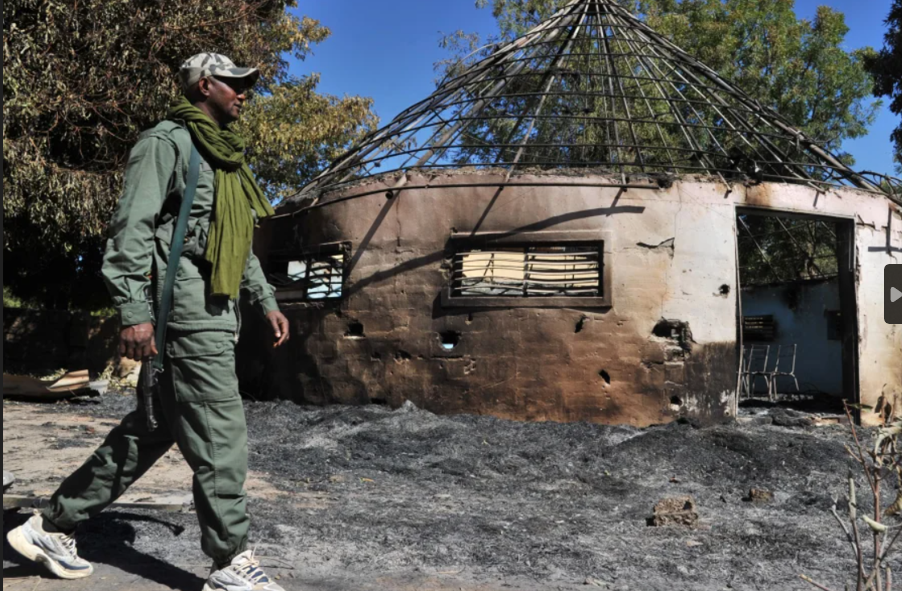Assault in Central Mali Kills Dozens in Insurgent Clash
Tragically, a community in central Mali was attacked, killing around 40 people. This incident highlights the persistent security concerns in the Sahel region of West Africa. This tragic incident adds to the area’s ten-year fight against insurgent groups affiliated to al Qaeda and Islamic State; it happened on Monday in the village of Djiguibombo in the Mopti region.
Jihadist activity has long been prevalent in the Mopti region and other portions of central and northern Mali. Local communities have been destabilized and national security operations have been hindered by the constant dangers posed by extremist organizations in certain places.
Incident Specifics
Officials from the area, who wished to remain anonymous owing to the gravity of the situation, said that the assault was very brutal. Reportedly, armed attackers surrounded the community and began firing randomly at the residents while they were celebrating a wedding. Some of the villagers were able to escape the assailants, while others were killed by them, as a result of the profound fear produced by the abrupt and violent attack.
In a phone interview with reporters, Bankass mayor Moulaye Guindo characterized the situation as “very serious,” stating that masked gunmen had encircled the community and opened fire on its inhabitants. The mayor was unable to provide a specific number of casualties, although other local reports put the number of deaths at roughly 40, with males making up the bulk of the dead.
No organization has come forward to take credit for the attack, and nobody knows who was behind it. Attempts to contact army spokespersons for comment have so far been ineffective, adding to the difficulties of getting up-to-date information from the impacted area.
The Regional Setting and Its Consequences
Instability has been a persistent problem in the Sahel region for more than a decade, and this most recent violent occurrence is just one more example of that. A tangled web of security concerns has been spun out over the central Sahel region of West Africa as insurgencies that began in Mali have extended to neighboring nations like Burkina Faso and Niger.
This protracted war has had devastating and far-reaching consequences:
The human cost is enormous, with thousands of lives lost and millions more forced from their homes, resulting in a major humanitarian catastrophe.
2. Political Unrest: The ongoing instability has played a role in the region’s political turmoil. Two coups have occurred in Mali since 2020, and one each in Burkina Faso and Niger, making it even more difficult to resolve the security issue.
3. The continuous violence has had a negative effect on the economy, making development efforts more difficult and discouraging investment in the areas hit hard.
A regional strategy for counter-terrorism and security measures is required due to the transnational nature of insurgent actions, which brings us to our fourth point: regional security.
Addressing International Concerns and Difficulties
The world community has not done nothing while these threats have been looming. Local governments have received support in their fight against extremist groups through the development of various projects and actions. But these initiatives have had mixed results, and security is still a major concern in many regions.
A key step toward resolving the situation was the ICC’s recent conviction of a leader affiliated to al Qaeda for war crimes and crimes against humanity perpetrated in Mali. This historic case shows that the world is serious about bringing those responsible for the crimes in the region to justice.
There are a lot of challenges to establishing peace in the Sahel region, though:
1. Large, Challenging Area: Security forces face difficulties in maintaining control and responding swiftly to attacks due to the large and frequently hostile landscape of the Sahel.
2. Difficult Ethnic and Social Dynamics: Efforts to develop cohesive responses to security threats are hindered by the region’s historically contentious and ethnically varied population.
Thirdly, insufficient state capacity: contending with armed and mobile insurgency organizations is a challenge for many afflicted nations due to a lack of resources and institutional capacity.
The capacity of extremist groups to operate beyond national boundaries necessitates coordinated actions, which can be challenging to execute, and this brings us to our fourth point: the cross-border nature of threats.
Proximity to Future Events
Several important areas will need to be addressed as the Sahel region continues to deal with these security challenges:
1. Enhancing Local Governance: Enhancing the ability and credibility of local governments to guarantee safety and essential services to their constituents.
2. Tackling the Sources: Confronting fundamental problems including poverty, limited economic prospects, and climate-related stresses that amplify instability.
Thirdly, we should work to improve regional cooperation by encouraging more cooperation among Sahel nations in the areas of intelligence sharing and counter-terrorism coordination.
4. Long-term development initiatives that can offer alternatives to individuals at risk of extremist recruitment constitute sustainable development.
5. foreign Support: Ensuring that foreign aid is maintained and improved so that it serves to bolster regional and local efforts without fostering dependence.
As if the problems in the Sahel weren’t bad enough, Djiguibombo was attacked. Supporting local efforts to develop resilience against extremist violence and address the complex issues fuelling the conflict, the international community must remain engaged as the area continues to seek paths toward stability and security.



















